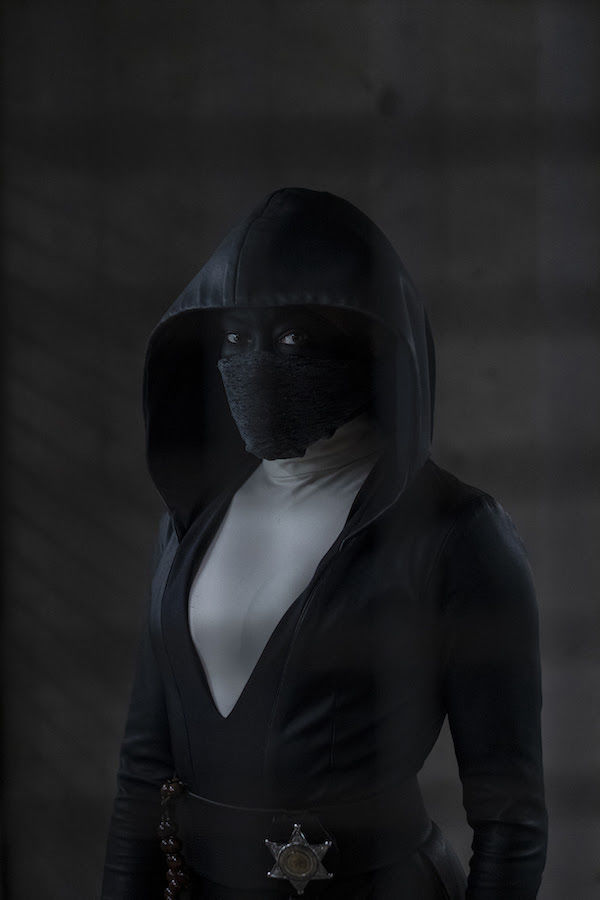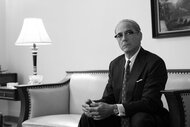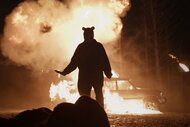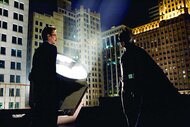Create a free profile to get unlimited access to exclusive videos, sweepstakes, and more!
Regina King reflects on how Watchmen made comic-book fiction seem real-world relevant

In its first (and so far only) outing, Watchmen proved itself one of those rare shows that seemed to resonate with viewers who approached from different directions. Whether as a new take on a lore-filled superhero series, or an empathetic observer of social tumult, HBO's adaptation of Alan Moore's classic comic deftly threaded its way through some very challenging source material.
The show's emotional center (as well as the focus of a lot of early Emmy Awards chatter) is Regina King, an actor who already has a trio of Emmys and an Oscar crowding her shelf. In Watchmen, King went up against an oppressive present-day plot in costume as Sister Night, while learning the heavy weight of her own personal legacy in plainclothes as Angela Abar. Framed by a tragic and dark piece of America's past — the real-life Tulsa massacre of 1921 that inspired the series' historical context — Abar discovers personal connections that suggest history can come flooding into the present at any time, even when it's uninvited.
Speaking with Yahoo TV last week, just before protests over the police-involved death of George Floyd began erupting in cities throughout the U.S., King reflected on how the Tulsa incident resonated with show creator Damon Lindelof from the start — and how timely some of the show's themes have proven in recent months, even before the current spate of protests and civil unrest.
The Tulsa massacre "struck something in him emotionally," said King, discussing how Lindelof selected the 1921 tragedy as the series' historical backdrop. To this day, estimates differ widely (with some counts ranging into the hundreds) on how many African-Americans in the city's Greenwood District died at the hands of a riotous mob of white Tulsa residents during the two-day assault.
Asked about the show's relevance in light of recent racial turmoil that predates the current protests, King was circumspect, but said real-life history has a way of repeating itself. "Look, we're talking about 1921, this happened," she said. "Cut to [today], same s**t's going down. There's the same mentality happening. We're not having another massacre, but it feels like we're having little mini-massacres all around."
Both good guys and bad guys in Watchmen wear masks, a phenomenon that's now a commonplace sight on U.S. streets — only a few short months after the show's ninth and final episode aired on Dec. 15 of last year. On the show, masks are meant to conceal identities; in real life, they're a precaution against the spread of the COVID-19 coronavirus. But the visual correlation between fictional TV imagery and what people now view as a normal part of being in public is striking.
"It's funny," said King, "because a girlfriend of mine just sent a picture of Sister Night to me and said, 'Who knew your costume was going to be our go-to grocery store attire?'"
As for whether Watchmen could ever return, either for a second season or as a standalone event series, King said she has no crystal ball — but she'd definitely be down if Lindelof and HBO decide to make the call. "I feel like 'Never say never,'" she said. "I do feel like we don't want it to be done unless it can be on par with the first season. And I just feel like that's a really tall order. But if anyone can fill that order then I think Damon Lindelof can. I think we all as castmates feel like if Damon leads, we'll follow."
Watchmen was released to Blu-ray this week with a trove of special behind-the-scenes features. You can also stream the complete series anytime at HBO Max.
(Yahoo TV)














